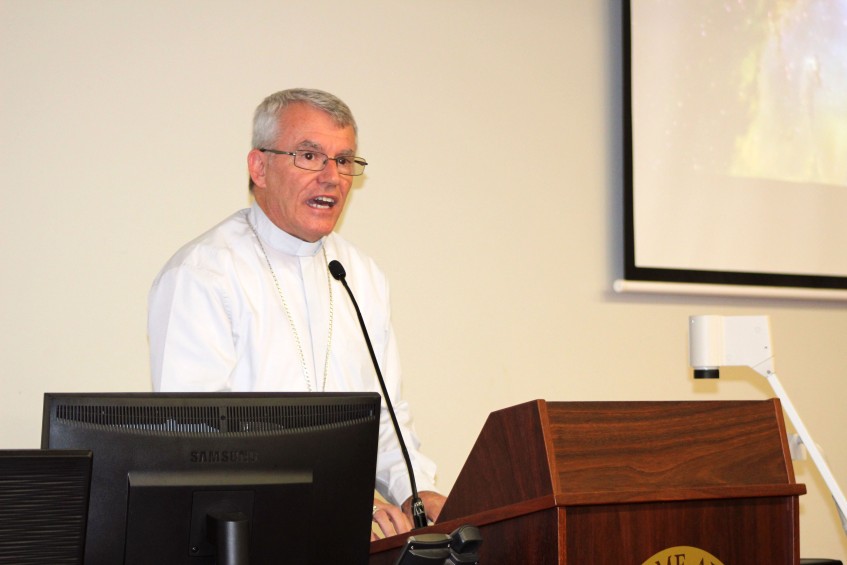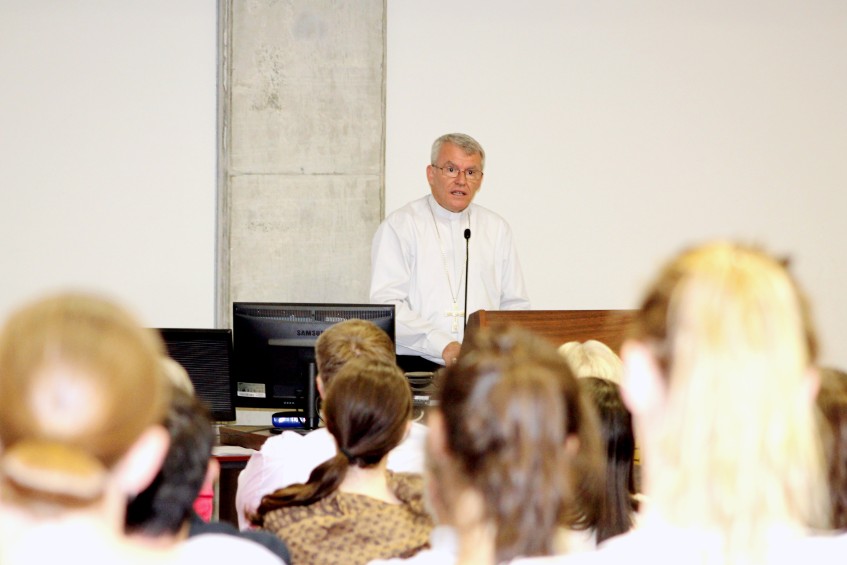Archbishop Costelloe: The Catholic faith, a guiding light on the road to knowledge and truth

The Archbishop addressed attendees of an interfaith event at the University of Notre Dame Australia’s Fremantle Campus on 27 April, speaking on faith and reason. Photo: Leigh Dawson, UNDA
By Josh Low
Archbishop Timothy Costelloe SDB has last week outlined the importance of the Catholic world view and its relationship between faith and reason at an interfaith event at the University of Notre Dame Australia’s Fremantle Campus.
Archbishop Costelloe stated that the topic of the address, which took place on Thursday 27 April, offered an invitation to consider faith and human reason having a positive relationship with each other.
He also added that contemporary Catholicism, instead of being a set of disconnected and intellectually groundless doctrines, is the inheritor and bearer of a long, rigorous and cohesive intellectual tradition which merits our attention, our consideration and our respect, partly because it has been so influential in the development of the Western culture and civilisation we inhabit.
“Another way of speaking of the Catholic intellectual tradition in view of this emphasis on what it means to be human, is to speak of a Catholic ‘world view’.
“A way, in other words, of holding together in a meaningful, a cohesive and, in the true sense of the word, a ‘rational’ fashion; the perplexing mystery of human life as we experience it,” Archbishop Costelloe said.
“I want to propose, and even insist, that first of all it is eminently reasonable to ask about the possibility of a creator, about God, and secondly that it is also eminently reasonable to form the view on the basis of logical thought and philosophical reasoning, that there is indeed a creator to whom we do in fact give the name ‘God’.
“Not everyone will come to this conclusion, and indeed it seems that in our own time more and more people are coming to the opposite conclusion.
“In view of this, I think it important to acknowledge that we are living in a rather peculiar period in history, in which, unlike the whole of recorded human history up until now, the existence of God is not almost universally accepted,” Archbishop Costelloe said.
“Some would say of course that this growing agnosticism, or atheism, is an inevitable result of the increasing sophistication of humanity.”

Archbishop Costelloe stressed that in the Catholic world view, the faith, as the Church proposes it to us, especially when done in a definitive way is like a light that guides us along the road. Photo: Leigh Dawson, UNDA
Archbishop Costelloe added that looking around the world today, questions could be raised on humanity and the search for knowledge and truth.
“As we look around the world in which we live today, however, with its grinding poverty in so many places, its proliferation of ever more destructive weapons of war, its obscene concentration of human wealth and resources in such a tiny percentage of the world’s population, the shocking prevalence of suicide in so-called developed and affluent societies, and so much more, I think, we can quite genuinely ask whether or not, in the areas which really count for human beings, we truly are caught up in an evolutionary process of greater and greater sophistication as human beings.
“Could it be instead that we are best marking time or even perhaps going backwards? Knowing more and more about the ‘what’ of things does not necessarily mean that we know more and more about the ‘why’ of things.
“And yet it is the ’why’ questions which are the most fundamental,” he said.
Archbishop Costelloe stressed that in the Catholic world view, the faith, as the Church proposes it to us, especially when done in a definitive way, is like a light that guides us along the road.
“It acts as a light which guides us as we travel the road of the human search for intelligibility, reason and truth, knowing that that search always has as its ultimate goal, the well-being, full flourishing and true dignity of people, both as individuals and as members of communities, cultures and societies which exist precisely for the same reason.
“To protect, defend and advance the true human worth and inviolable dignity of every human person,” he concluded.
